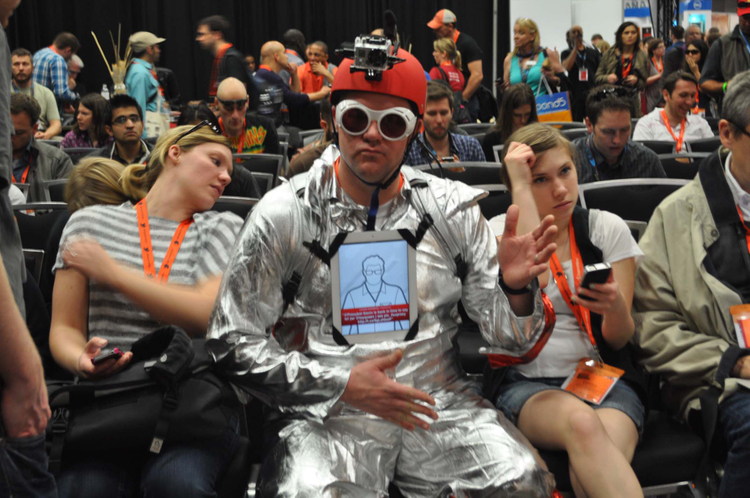Al Gore was deep in conversation with "the Napster" himself, Sean Parker. Bruce Springsteen gave a keynote speech before playing a theatre show with the E Street Band. Celebrity chef Anthony Bourdain was part of a panel discussion. Jay-Z, Lil Wayne and (possibly) Kanye West were all there.
This certainly wasn’t an advertising conference. And I wasn’t sure why I came.
For the last six months, whenever I told anyone that I was going to Austin for SXSW (South by Southwest), they gave me either a look of intense jealousy or, more frequently, a completely blank stare.
SXSW, a name that gives more than a knowing nod to Alfred Hitchcock's film North by Northwest, has run annually for 25 years. Growing up in Sydney and being completely obsessed with music, every year I heard about this festival as the place where bands from around the world who wanted to be signed by the major record labels went to play.
Over time I learned a second thing about SXSW: It’s held in a city in Texas where the motto is "Keep Austin Weird" (which I like even more than "Virginia Is For Lovers"). A quarter of a century later, SXSW still delivers on both fronts, and increasingly, a whole lot more.
"Increasing" is an important theme when it comes to SXSW. Held in Texas, where, believe me, everything is bigger than anywhere else on the planet, nothing could have prepared me for the sheer size of this event. Calling SXSW a "festival" doesn't do it justice. It's actually three enormous festivals in one, centered on interactive (whatever that means these days...), film and music, with an almost fourth part based around gaming. If Moore's Law about exponential growth has additional applications, then the increase in size, influence and importance of SXSW is surely among them.
While some cities use conferences to transform themselves, SXSW is a reflection of Austin itself. In addition to hosting SXSW, Austin is also home to around 1,300 food trucks. (I recommend checking out The Peached Tortilla, which serves incredible chicken pad Thai tacos.) This number of "startups" serves as an even better indicator of the city's entrepreneurial spirit than do the resident major tech companies such as Dell, Apple, eBay, PayPal and Samsung.
The entrepreneurship also extends to how SXSW is programmed. As incredible as the celebrity speakers mentioned above are, one thing that sets this festival apart from other events (aside from its 10-day length) is its user-generated, and user-selected, panels. This year I caught panels that we attendees proposed and that covered topics as diverse as hyper-locality, social TV, mobile gaming, music publishing, coolfarming, mixtapes, food trucks, the fashion cycle and Lego. Certainly not the subjects discussed at advertising conferences.
Choosing which panels to attend is an epic task, and there are two key pieces of advice that I took and encourage others to follow. The first is to give up before you start and accept that it's physically impossible to see everything. Do this at the beginning of SXSW and you'll feel a lot less angst/guilt as the festival rolls on, and enjoy the parts that you do see a whole lot more.
The second tip came from a Facebook update by HotHouse Interactive's Simon Van Wyk: "Have a better strategy for choosing seminars—choose the weird ones". I think that Simon's right. And herein lies the true value of SXSW: It's not an advertising industry conference.
Now I know why I went to Texas. After attending SXSW for the first time, I know for sure that we need to come here precisely because it isn't an advertising conference. Being far outnumbered by those in the entertainment industries, tech startups and fans of music and film is a great reminder of what a small part we play in the world (which is rather handy, because unlike other conferences there's little place for pretension or self-importance in Texas).
Spending time with people from different industries affords us the opportunity to learn a lot. Although we talk endlessly about moving beyond the 30-second TV spot to become content creators, those in the music and film industries have been doing it for a very long time. And they've figured out how to create something sufficiently compelling that they can charge people money to access it instead of paying media outlets vast sums to run it.
While meeting those in the tech industry is a great crash course in what’s happening—and more importantly what’s going to happen—in all things digital, this year has highlighted how creative isn't just about the "big idea". It’s equally about how we create, adapt and deploy technology. In an age where everything is digital, coders are becoming the new copywriters.
As incredible as what I've seen and experienced is, what I haven't seen a lot of is people from the Asia-Pacific region travelling to Austin for the event. So if you're fortunate enough in 2013 to get a choice between attending Cannes or SXSW, I hope to see y'all in Texas. We need all the help we can get to keep Austin—and advertising—weird.





































.jpg&h=334&w=500&q=100&v=20170226&c=1)


.jpg&h=334&w=500&q=100&v=20170226&c=1)



.jpg&h=334&w=500&q=100&v=20170226&c=1)



.jpg&h=268&w=401&q=100&v=20170226&c=1)




.jpg&h=268&w=401&q=100&v=20170226&c=1)